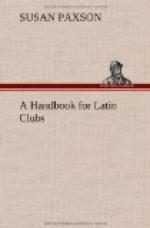—Sir Richard Fanshawe
TO A SCHOOLMASTER
Martial. Book X, lxii
Thou monarch of eight parts of speech,
Who sweep’st with birch a youngster’s
breech,
Oh! now awhile withhold your hand!
So may the trembling crop-hair’d band
Around your desk attentive hear,
And pay you love instead of fear;
So may yours ever be as full,
As writing or as dancing school.
The scorching dog-day is begun;
The harvest roasting in the sun;
Each Bridewell keeper, though requir’d
To use the lash, is too much tir’d.
Let ferula and rod together
Lie dormant, till the frosty weather.
Boys do improve enough in reason,
Who miss a fever in this season.
—John Hay
EPITAPH ON EROTION
Martial. Book X, lxi
Underneath this greedy stone,
Lies little sweet Erotion;[3]
Whom the Fates, with hearts as cold,
Nipp’d away at six years old.
Thou, whoever thou mayst be,
That hast this small field after me,
Let the yearly rites be paid
To her little slender shade;
So shall no disease or jar
Hurt thy house, or chill thy Lar;
But this tomb be here alone
The only melancholy stone.
—Leigh Hunt
[Footnote 3: A little girl who died at six years of age.]
NON AMO TE
Martial. I, 32
Non amo te, Sabidi, nec possum dicere quare:
Hoc tantum possum dicere, non amo te.[4]
[Footnote 4: This well
known epigram is the original of one
equally famous in English,
that written by Tom Brown on Dr. John
Fell, about 1670.
“I do not
like thee, Dr. Fell.
The reason why
I cannot tell;
But this I know
and know full well
I do not like
thee, Dr. Fell.” ]
GRATITUDE
Some hae meat and canna eat,
And some wad eat that want it;
But we hae meat and we can eat
And sae the Lord be thanket.
—Burns
Translation
Sunt quibus est panis
nec amor tamen ullus edendi:
Sunt quibus hic amor est
deest tamen ipse cibus.
Panis at est nobis
et amor quoque panis edendi
Pro quibus est Domino
gratia habenda Deo.
—The Lawrence Latinist
A HYMN TO THE LARES
It was, and still my care is,
To worship ye, the Lares,
With crowns of greenest parsley,
And garlick chives not scarcely;
For favors here to warme me,
And not by fire to harme me;
For gladding so my hearth here,
With inoffensive mirth here;
That while the wassaile bowle here
With North-down ale doth troule here,
No sillable doth fall here,
To marre the mirth at all here.
For which, O chimney-keepers!
(I dare not call ye sweepers)
So long as I am able
To keep a country-table
Great be my fare, or small cheere,
I’ll eat and drink up all here.




